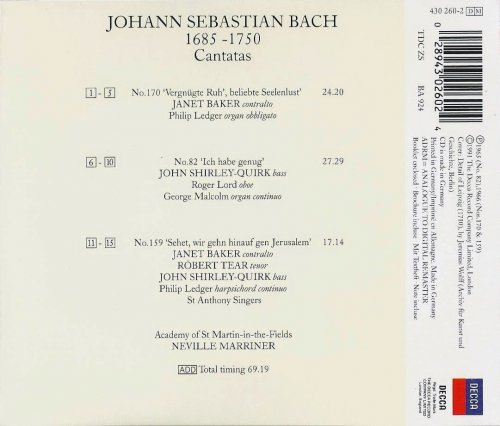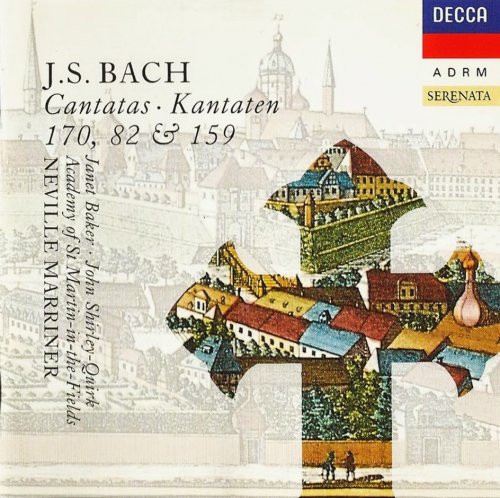
Neville Marriner - J.S. Bach: Cantatas 170, 82 & 159 (1991)
BAND/ARTIST: Neville Marriner
- Title: J.S. Bach: Cantatas 170, 82 & 159
- Year Of Release: 1991
- Label: Decca
- Genre: Classical
- Quality: FLAC (image+.cue,scans)
- Total Time: 01:09:13
- Total Size: 363 Mb
- WebSite: Album Preview
Tracklist:
01. Cantatas No.170 'Vergnugte Ruh', Beliebte, Seelenlust': Arie 'Vergnugte Ruh', beliebte Seelenlust' [0:06:56.50]
02. Cantatas No.170 'Vergnugte Ruh', Beliebte, Seelenlust': Rezitativ 'Die Welt, das Sundenhaus' [0:01:46.55]
03. Cantatas No.170 'Vergnugte Ruh', Beliebte, Seelenlust': Arie 'Wie jammern mich doch die verke [0:07:26.08]
04. Cantatas No.170 'Vergnugte Ruh', Beliebte, Seelenlust': Rezitativ 'Wer sollte sich demnach' [0:01:24.37]
05. Cantatas No.170 'Vergnugte Ruh', Beliebte, Seelenlust': Arie 'Mir ekelt mehr zu leben' [0:06:53.00]
06. Cantatas No.82 'Ich Habe Genug': Arie 'Ich habe genug' [0:09:42.38]
07. Cantatas No.82 'Ich Habe Genug': Rezitativ 'Ich habe genug' [0:01:27.37]
08. Cantatas No.82 'Ich Habe Genug': Arie 'Schlummert ein, ihr matten Augen' [0:11:13.13]
09. Cantatas No.82 'Ich Habe Genug': Rezitativ 'Mein Gott! wann kommt das schone: Nun!' [0:00:58.62]
10. Cantatas No.82 'Ich Habe Genug': Arie 'Ich freue mich auf meinen Tod' [0:04:16.25]
11. Cantatas No.159 'Sehet, Wir Gehn Hinauf Gen Jerusalem': Arioso und Rezitativ 'Sehet, wir gehn [0:03:25.63]
12. Cantatas No.159 'Sehet, Wir Gehn Hinauf Gen Jerusalem': Arie und Choral 'Ich folge dir nach' [0:04:58.25]
13. Cantatas No.159 'Sehet, Wir Gehn Hinauf Gen Jerusalem': Rezitativ 'Nun will ich mich, mein Jesu [0:01:28.00]
14. Cantatas No.159 'Sehet, Wir Gehn Hinauf Gen Jerusalem': Arie 'Es ist volbracht' [0:05:28.37]
15. Cantatas No.159 'Sehet, Wir Gehn Hinauf Gen Jerusalem': Chor 'Jesu, deine Passion' [0:01:53.38]
Performers:
Janet Baker - contralto
John Shirley-Quirk - bass
Robert Tear - bass
Academy of St.Martin-in-the-Fields
Neville Marriner – conductor

01. Cantatas No.170 'Vergnugte Ruh', Beliebte, Seelenlust': Arie 'Vergnugte Ruh', beliebte Seelenlust' [0:06:56.50]
02. Cantatas No.170 'Vergnugte Ruh', Beliebte, Seelenlust': Rezitativ 'Die Welt, das Sundenhaus' [0:01:46.55]
03. Cantatas No.170 'Vergnugte Ruh', Beliebte, Seelenlust': Arie 'Wie jammern mich doch die verke [0:07:26.08]
04. Cantatas No.170 'Vergnugte Ruh', Beliebte, Seelenlust': Rezitativ 'Wer sollte sich demnach' [0:01:24.37]
05. Cantatas No.170 'Vergnugte Ruh', Beliebte, Seelenlust': Arie 'Mir ekelt mehr zu leben' [0:06:53.00]
06. Cantatas No.82 'Ich Habe Genug': Arie 'Ich habe genug' [0:09:42.38]
07. Cantatas No.82 'Ich Habe Genug': Rezitativ 'Ich habe genug' [0:01:27.37]
08. Cantatas No.82 'Ich Habe Genug': Arie 'Schlummert ein, ihr matten Augen' [0:11:13.13]
09. Cantatas No.82 'Ich Habe Genug': Rezitativ 'Mein Gott! wann kommt das schone: Nun!' [0:00:58.62]
10. Cantatas No.82 'Ich Habe Genug': Arie 'Ich freue mich auf meinen Tod' [0:04:16.25]
11. Cantatas No.159 'Sehet, Wir Gehn Hinauf Gen Jerusalem': Arioso und Rezitativ 'Sehet, wir gehn [0:03:25.63]
12. Cantatas No.159 'Sehet, Wir Gehn Hinauf Gen Jerusalem': Arie und Choral 'Ich folge dir nach' [0:04:58.25]
13. Cantatas No.159 'Sehet, Wir Gehn Hinauf Gen Jerusalem': Rezitativ 'Nun will ich mich, mein Jesu [0:01:28.00]
14. Cantatas No.159 'Sehet, Wir Gehn Hinauf Gen Jerusalem': Arie 'Es ist volbracht' [0:05:28.37]
15. Cantatas No.159 'Sehet, Wir Gehn Hinauf Gen Jerusalem': Chor 'Jesu, deine Passion' [0:01:53.38]
Performers:
Janet Baker - contralto
John Shirley-Quirk - bass
Robert Tear - bass
Academy of St.Martin-in-the-Fields
Neville Marriner – conductor
A warm welcome to this reissue which has a cleaner sound than the original L'OiseauLyre. Dame Janet is on what sounds to be her best form, with almost impeccable intonation and a warmth which gives the performances an intense glow. Vergnügte Ruh' begins with a haunting melody of such expressive dimensions that, for me, the remainder of the cantata is something of an emotional unwinding. On numerous other levels, however, the succeeding movements are satisfying and well contrasted with one another. Against the tender 12/8 opening aria Bach sets another, strikingly different one, whose key (F sharp minor), chromaticism, almost unbridled demi-semi-quaver passages and lack of basso continuo all serve to emphasize the lament of a lost soul. The last aria, one of rejoicing, is unusual with its concertante organ; such is the writing here that Bach must have had a fairly small ensemble in mind.
Bach's Quinquagesima Cantata, "Come, let us go up to Jerusalem" is a sustained essay in suffering. Alfred Darr has commented on the specially high artistic skill which Bach lavished on the music for that Sunday in the church year; this work dating from 1729, is the last of them and, perhaps, the most poignant of all. The text is concerned with the prophesies of Christ's suffering and death and contains passages of direct speech for Jesus and the Soul, who are presented both in solo and in dialogue. Text and music are not far removed from the spirit of Bach's two great Passion settings and, small scale though it is, this cantata is worthy of standing alongside them. The soloists give strong performances and the grief-laden climax "Es ist vollbracht" for bass and solo oboe is effective. A jarring note was struck by the fussy harpsichord continuo here and there and the instrumental playing, especially in the lower strings, was too heavy for my taste; but there is still a great deal to enjoy in these interpretations even though they are stylistically a little old fashioned.
Bach's Quinquagesima Cantata, "Come, let us go up to Jerusalem" is a sustained essay in suffering. Alfred Darr has commented on the specially high artistic skill which Bach lavished on the music for that Sunday in the church year; this work dating from 1729, is the last of them and, perhaps, the most poignant of all. The text is concerned with the prophesies of Christ's suffering and death and contains passages of direct speech for Jesus and the Soul, who are presented both in solo and in dialogue. Text and music are not far removed from the spirit of Bach's two great Passion settings and, small scale though it is, this cantata is worthy of standing alongside them. The soloists give strong performances and the grief-laden climax "Es ist vollbracht" for bass and solo oboe is effective. A jarring note was struck by the fussy harpsichord continuo here and there and the instrumental playing, especially in the lower strings, was too heavy for my taste; but there is still a great deal to enjoy in these interpretations even though they are stylistically a little old fashioned.

As a ISRA.CLOUD's PREMIUM member you will have the following benefits:
- Unlimited high speed downloads
- Download directly without waiting time
- Unlimited parallel downloads
- Support for download accelerators
- No advertising
- Resume broken downloads


